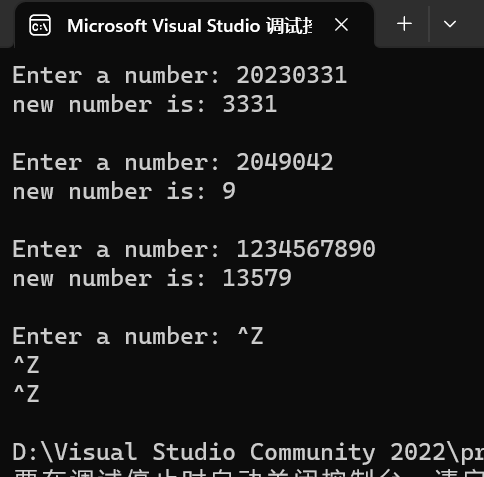实验3
task1.c
1 #include <stdio.h> 2 #include <stdlib.h> 3 #include <time.h> 4 #include <windows.h> 5 #define N 80 6 void print_text(int line, int col, char text[]); 7 void print_blank_lines(int n); 8 int main() { 9 int line, col, i; 10 char text[N] = "hi, April~"; 11 srand(time(0)); 12 for (i = 1; i <= 10; ++i) { 13 line = rand() % 25; 14 col = rand() % 80; 15 print_text(line, col, text); 16 Sleep(1000); 17 } 18 return 0; 19 } 20 void print_spaces(int n) { 21 int i; 22 for (i = 1; i <= n; ++i) 23 printf(" "); 24 } 25 void print_blank_lines(int n) { 26 int i; 27 for (i = 1; i <= n; ++i) 28 printf("\n"); 29 } 30 void print_text(int line, int col, char text[]) { 31 print_blank_lines(line - 1); 32 print_spaces(col - 1); 33 printf("%s", text); 34 }
代码作用:
以系统时间为随机种子生成随机数,打印随机空格和换行,并打印字符串,进行十次
task2_1.c
1 #include <stdio.h> 2 long long fac(int n); 3 int main() { 4 int i, n; 5 printf("Enter n: "); 6 scanf_s("%d", &n); 7 for (i = 1; i <= n; ++i) 8 printf("%d! = %lld\n", i, fac(i)); 9 return 0; 10 } 11 long long fac(int n) { 12 static long long p = 1; 13 p = p * n; 14 return p; 15 }
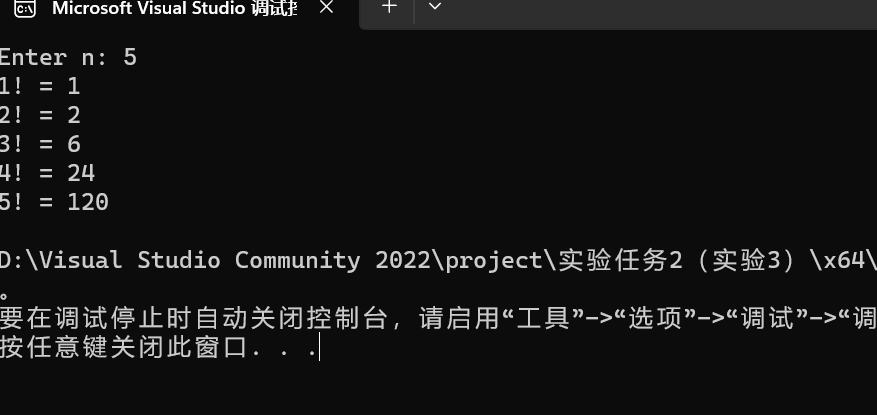
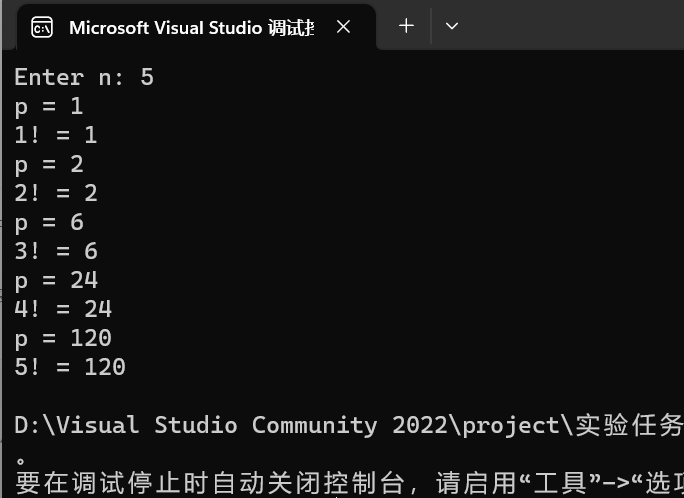
task2_2.c
1 #include <stdio.h> 2 int func(int, int); // 函数声明 3 int main() { 4 int k = 4, m = 1, p1, p2; 5 p1 = func(k, m); // 函数调用 6 p2 = func(k, m); // 函数调用 7 printf("%d, %d\n", p1, p2); 8 return 0; 9 } 10 // 函数定义 11 int func(int a, int b) { 12 static int m = 0, i = 2; 13 i += m + 1; 14 m = i + a + b; 15 return m; 16 }
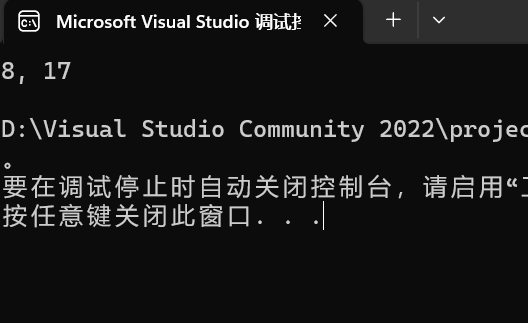
运行结果与我判断一致
总结局部static变量特点:
1.局部性,该变量只能作用于定义其的函数或复合语句中,只有在函数内部有效,离开函数就不能再被使用
2.静态存储,该变量在程序运行期间有系统分配固定的存储空间,当再次进入函数时,使用上次的结果,即具有继承性
task3.c
1 #include <stdio.h> 2 long long func(int n); // 函数声明 3 int main() { 4 int n; 5 long long f; 6 while (scanf_s("%d", &n) != EOF) { 7 f = func(n); // 函数调用 8 printf("n = %d, f = %lld\n", n, f); 9 } 10 return 0; 11 } 12 long long func(int n) { 13 long long f; 14 if (n == 1) f = 1; 15 if (n >=2) { 16 f= 2 * func(n - 1) + 1; 17 } 18 return f; 19 }
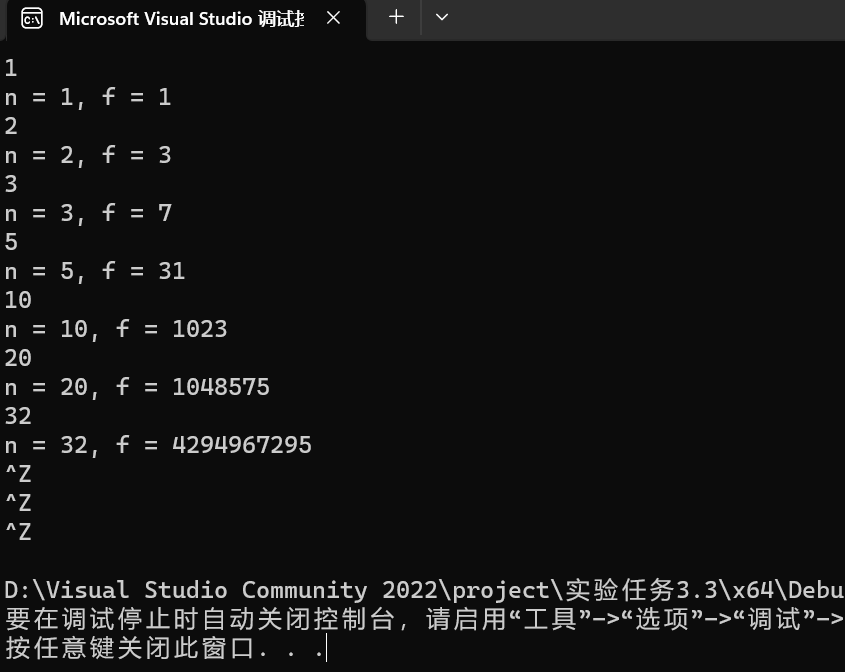
task4.c
1 #include <stdio.h> 2 int func(int n, int m); 3 int main() { 4 int n, m; 5 while (scanf_s("%d%d", &n, &m) != EOF) 6 printf("n = %d, m = %d, ans = %d\n", n, m, func(n, m)); 7 return 0; 8 } 9 int func(int n, int m) { 10 int ans; 11 if (n == m) ans = 1; 12 else if (m == 1) ans = n; 13 else if (n == 0) ans = 0; 14 else 15 ans = func(n - 1, m) + func(n - 1, m - 1); 16 return ans; 17 }
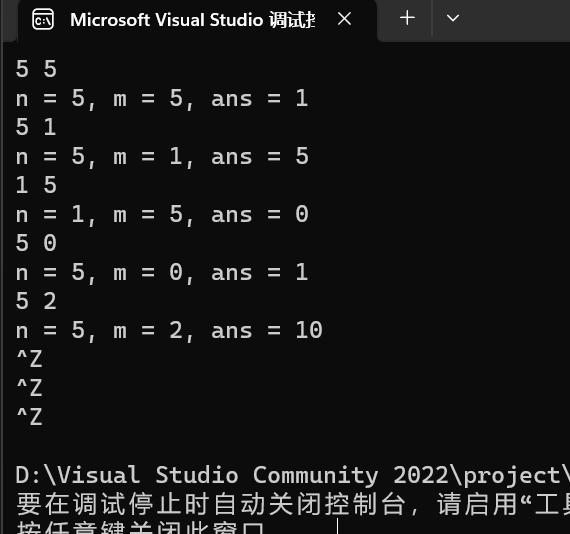
task5_1.c
1 #include <stdio.h> 2 double mypow(int x, int y); // 函数声明 3 int main() { 4 int x, y; 5 double ans; 6 while (scanf_s("%d%d", &x, &y) != EOF) { 7 ans = mypow(x, y); // 函数调用 8 printf("%d的%d次方: %g\n\n", x, y, ans); 9 } 10 return 0; 11 } 12 double mypow(int x, int y) { 13 int i ,j; 14 double ans=1.0; 15 if (y >= 0) 16 { 17 for (i = 1; i <= y; i++) 18 ans = ans * x; 19 } 20 else 21 { 22 for (i = 1; i <= ( - y); i++) 23 ans = ans / x; 24 } 25 return ans; 26 }
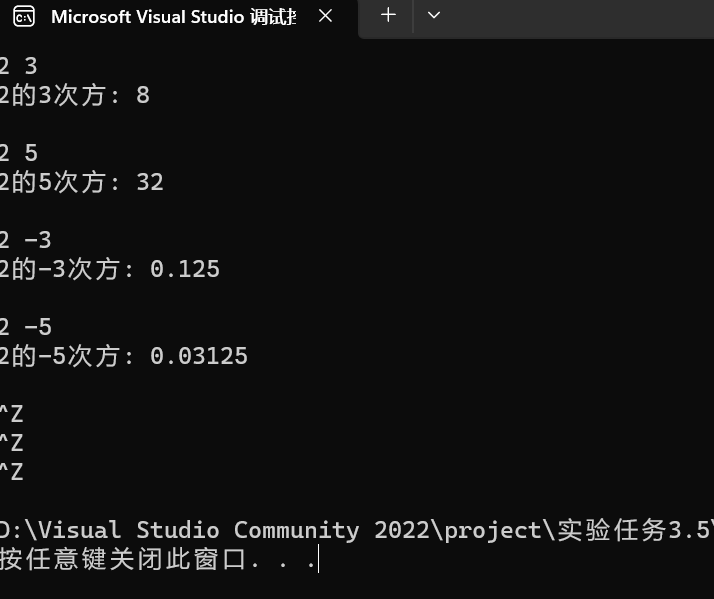
task5_2.c
1 #include <stdio.h> 2 double mypow(int x, int y); // 函数声明 3 int main() { 4 int x, y; 5 double ans; 6 while (scanf_s("%d%d", &x, &y) != EOF) { 7 ans = mypow(x, y); // 函数调用 8 printf("%d的%d次方: %g\n\n", x, y, ans); 9 } 10 return 0; 11 } 12 double mypow(int x, int y) { 13 double ans; 14 if (y == 0) ans = 1; 15 else if (y > 0) ans = x * mypow(x, y - 1); 16 else ans = 1.0 / mypow(x, (-y)); 17 return ans; 18 }
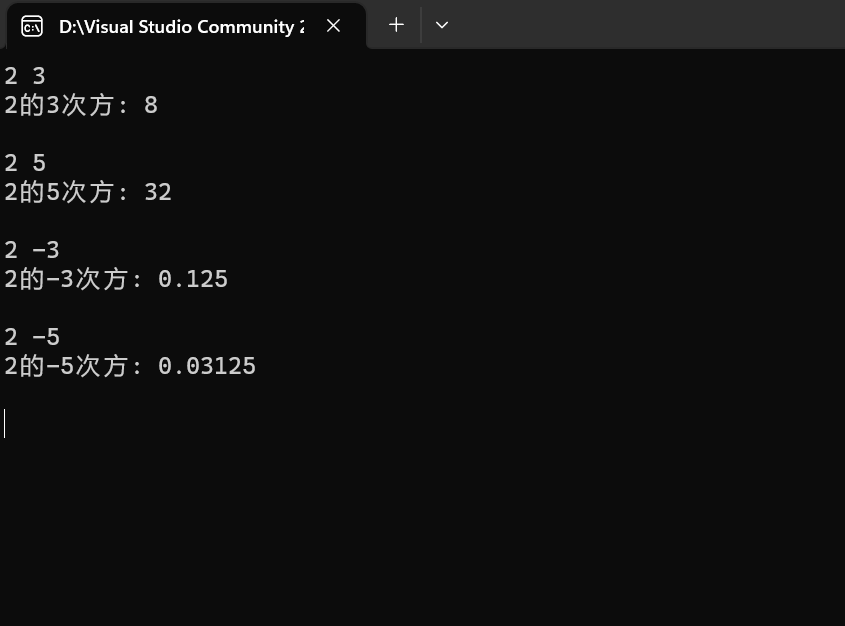
task6.c
1 #include <stdio.h> 2 #include <stdlib.h> 3 4 void hanoi(unsigned int n, char from, char temp, char to); 5 void moveplate(unsigned int n, char from, char to); 6 int t = 0; 7 int main() { 8 unsigned int n; 9 while ((scanf_s("%u", &n)) != 0) 10 11 { 12 hanoi(n, 'A', 'B', 'C'); 13 printf("\n\n一共移动了%d次", t); 14 } 15 16 17 system("pause"); 18 19 return 0; 20 } 21 22 void hanoi(unsigned int n, char from, char temp, char to) { 23 if (n == 1) 24 moveplate(n, from, to); 25 else { 26 hanoi(n - 1, from, to, temp); 27 moveplate(n, from, to); 28 hanoi(n - 1, temp, from, to); 29 } 30 31 32 } 33 34 void moveplate(unsigned int n, char from, char to) { 35 printf("%u: %c --> %c\n", n, from, to); 36 t = t + 1; 37 }

tsak7.c
1 #include <stdio.h> 2 int is_prime(int ); 3 int main() { 4 int i, j; 5 6 for (j = 4; j <= 20; j += 2) 7 { 8 for (i = 2; i <= j / 2; i++) 9 { 10 if (is_prime(i) && is_prime(j - i)) 11 { 12 printf("%d=%d+%d\n", j, i, j - i); 13 break; 14 } 15 } 16 } 17 return 0; 18 19 } 20 int is_prime(int n) { 21 int i = 2, t; 22 23 for (; n % i != 0 && i <= n; ) 24 { 25 i++; 26 } 27 if (n == i) 28 t = 1; 29 30 else 31 t = 0; 32 33 return (t); 34 35 36 37 38 }
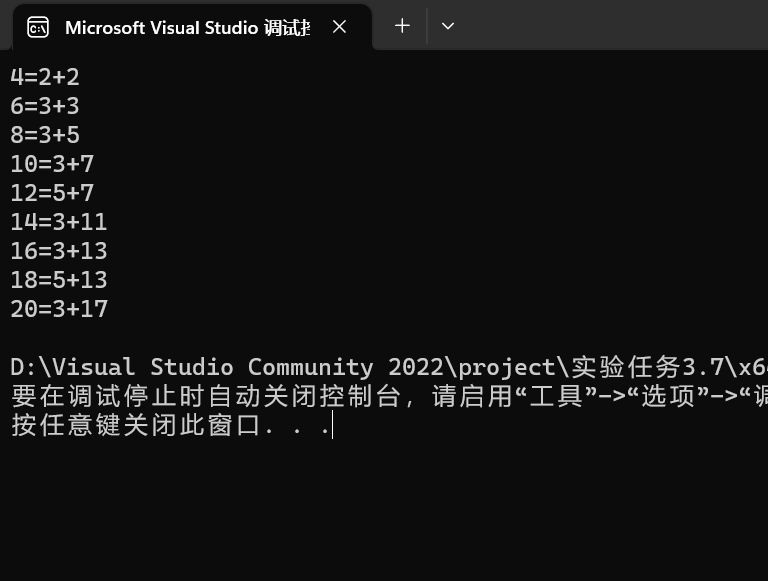
task8.c
1 #include <stdio.h> 2 #include <math.h> 3 long func(long s); 4 int main() { 5 long s, t; 6 printf("Enter a number: "); 7 while (scanf_s("%ld", &s) != EOF) { 8 t = func(s); // 函数调用 9 printf("new number is: %ld\n\n", t); 10 printf("Enter a number: "); 11 } 12 return 0; 13 } 14 long func(long s) { 15 int t, n=0, i = 0; 16 while (s != 0) 17 { 18 t = s % 10; 19 if (t % 2 != 0) 20 { 21 n = n+ pow(10, i) * t; 22 i++; 23 } 24 25 s= s/ 10; 26 27 28 } 29 return n; 30 31 }
